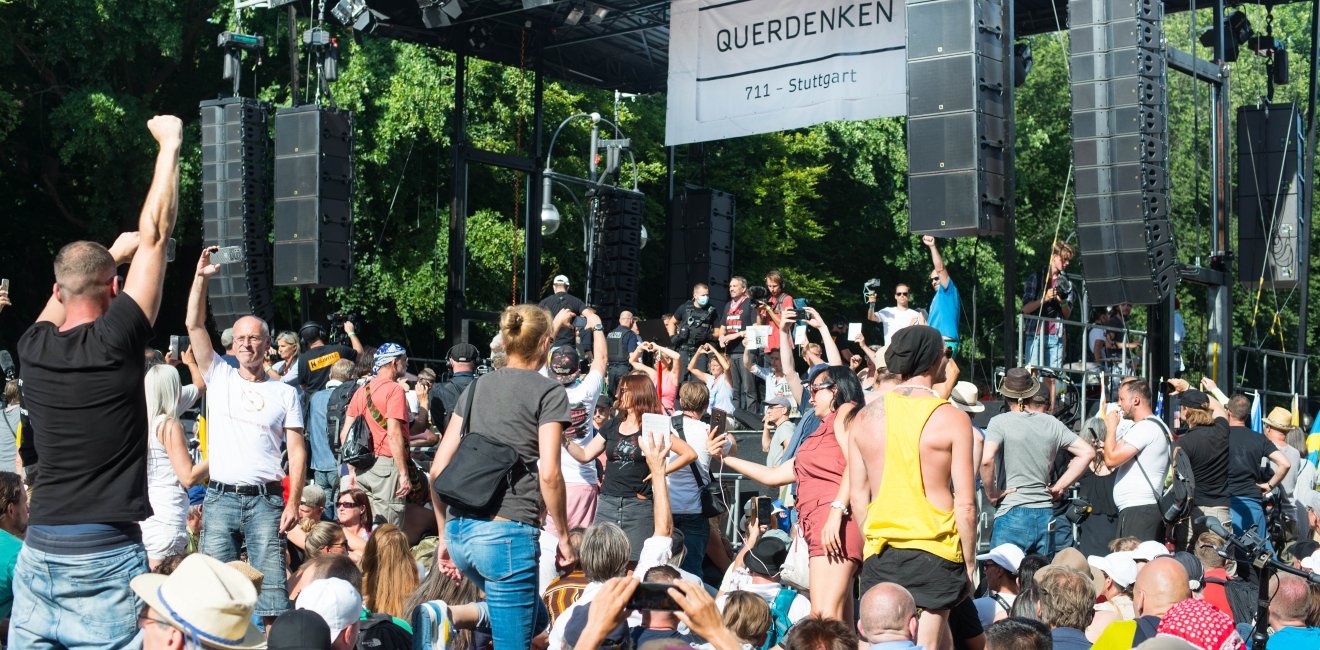This article was originally published at the American Center for Contemporary German Studies.
Thinking outside the box rarely attracts nationwide surveillance. But when conspiracy theorists claim the mantle to contest basic science and jeopardize public health, governments have a responsibility to prevent the spread of dangerous misinformation.
The Querdenker (or “Thinking Outside the Box”) movement was already on the watchlist of several German states. In April, the German Verfassungsschutz, the domestic intelligence agency for the Protection of the Constitution, decided to monitor the movement nationwide.
Since the main protagonists of the movement defy easy classifications of right-wing, left-wing, and Islamist extremism, the Verfassungsschutz created a new category called Delegitimization of the State Relevant to the Protection of the Constitution.
The intelligence office’s decision has no direct influence on the ongoing Querdenker protests, which will likely continue. But the government can now track the relevant actors of the Querdenker movement. The Verfassungsschutz has several tools at its disposal, including storing personal data, infiltrating the movement with undercover agents, and in justified cases, monitoring communications and financial flows. While German intelligence stopped short of defining the movement as extremist, it will focus on actors who have a leading role in the organization of protests and subvert the democratic process and the German constitution.
Despite obvious ties to right-wing extremists and the Reichsbüger movement, the parts of the movement that are considered extremist do not map neatly onto existing categories. Since the main protagonists of the movement defy easy classifications of right-wing, left-wing, and Islamist extremism, the Verfassungsschutz created a new category called Verfassungsschutzrelevante Delegitimierung des Staates (Delegitimization of the State Relevant to the Protection of the Constitution). This category facilitates the monitoring of actors that are working to delegitimize the German state.
They see themselves as a grassroots phenomenon that arose “after the opposition parties refused to do their job.”
Since 2020, the so-called “Querdenker 711” (711 being the area code of Stuttgart, where the movement originated) has denied the existence of the coronavirus and belittled the consequences of an infection. They reject the restrictions imposed by the federal and state governments on public life; they oppose Covid-19 vaccinations, and they are highly critical of established political parties. The Querdenker are a motley crew and attract support from Esoterics, Reichsbürger, anti-vaxxers, well-known conspiracy theorists, and QAnon followers.
In response to several articles pointing to the movement’s connection to the far-right AfD party, the Querdenker movement published a statement on their website in April. The movement claimed that it is “a non-partisan initiative,” with no ties to the AfD or other parties. They see themselves as a grassroots phenomenon that arose “after the opposition parties refused to do their job.”
The Querdenker claim their supporters identify with many parties, citing a study of Oliver Nachtwey (University Basel). Based on the voting behavior in the last federal election in 2017, Nachtwey concluded that the supporters of Querdenken are primarily composed of voters of the Greens (21 percent), the Left party (17 percent), and the AfD (14 percent). When citing the study, however, the Querdenker obscure two important details: first, of the 622 participants that participated in the survey, a fifth (21 percent) state that they voted for a party in 2017 that was not named as an option (options were: The Greens, Linke, AfD, CDU/CSU/, FDP, SPD); second, participants were also asked which party they would vote for today. Sixty-one percent said they would vote for a party other than those currently represented in the Bundestag. One such party is Die Basis. Founded in 2020, Die Basis describes itself as a grassroots party and benefited from the social upheaval during the pandemic. It faces allegations of welcoming supporters of “conspiracy theories, virus deniers, extremists” in its ranks.
The new category “Delegitimization of the State” will enable German intelligence to better understand and monitor the evolution of anti-government forces… [which] can be found in both left- and right-wing extremist circles, and even among disenfranchised non-voters.
After the decision by the German Verfassungsschutz, representatives of the Querdenker movement were quick to emphasize that they were acting within the boundaries of constitutional law. Their behavior suggests otherwise. Querdenker-protagonists exploited demonstrations against the Corona policies and lockdowns, which led to calls for violence and physical assaults on counter-protestors and the police. This growing readiness to use violence and promote conspiracy theories combined with a dogma that divides everything into good and evil is a toxic brew. It suggests a strong potential for further radicalization.
Several protagonists of the movement seek out connections to “Reich citizens” as well as right-wing extremists. The proximity of this movement to right-wing elements in society is plain to see. One of the most prominent figures of the Reichsbürger movement, Peter Fitzek (who has already been sentenced to prison several times), organized an anti-lockdown protest in Saalfeld, Thuringia. Querdenker organizer Michael Ballweg was also present as a participant. According to research done by Der Spiegel, the Verfassungsschutz uncovered that Ballweg opened an account in September 2020 with the GemeinwohlKasse, a bank of the Reichsbürger organization.
The new category “Delegitimization of the State” will enable German intelligence to better understand and monitor the evolution of anti-government forces, such as the “Reichsbürger” movement in Germany. It also reflects a new political reality. For the first time, the Verfassungsschutz can classify extremist actors not solely based on ideology. Anti-government forces can be found in both left- and right-wing extremist circles, and even among disenfranchised non-voters. Conspiracy theories about the virus and a “global cabal” further complicate the ability to situate these actors along the traditional left-right political spectrum.
Adjusting how we classify these newly emerging protest movements is a step in the right direction. But so far, the consequences for the instigators have been relatively minor. Attila Hildmann, one of the key figures in spreading Covid-19 conspiracy theories, successfully evaded prosecution by Germany, fled to Turkey in February 2021, and runs a Telegram channel with around 112,000 subscribers.
Enforcement, transparency, and accountability should be the watchwords. German intelligence will need to act wisely and expeditiously to curb the spread of extremist movements even as the country reinvigorates a national debate on the purpose of surveillance and the need to ensure that it reflects democratic principles. In times of crisis and conspiracy, governments also need to think outside the box.
Authors


Global Europe Program
The Global Europe Program is focused on Europe’s capabilities, and how it engages on critical global issues. We investigate European approaches to critical global issues. We examine Europe’s relations with Russia and Eurasia, China and the Indo-Pacific, the Middle East and Africa. Our initiatives include “Ukraine in Europe”—an examination of what it will take to make Ukraine’s European future a reality. But we also examine the role of NATO, the European Union and the OSCE, Europe’s energy security, transatlantic trade disputes, and challenges to democracy. The Global Europe Program’s staff, scholars-in-residence, and Global Fellows participate in seminars, policy study groups, and international conferences to provide analytical recommendations to policy makers and the media. Read more





